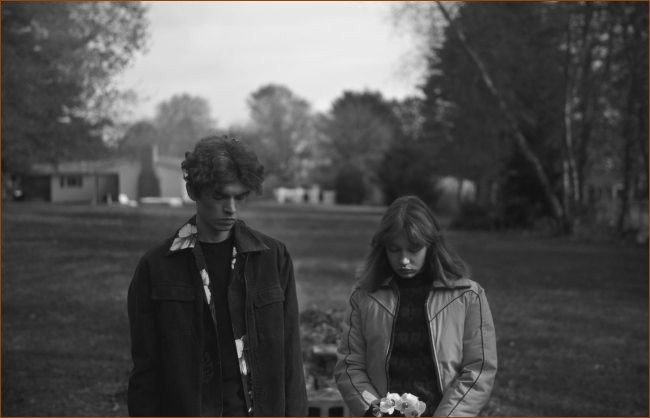“It would be good for you to socialize with someone. Even the pedophiles!”
Such is the oddly heartwarming—yet profoundly unsettling—advice doled out by Ethel (Eliza Roberts) to her socially stunted son, known solely as Hippo (Kimball Farley). Ethel’s maternal instincts seem a tad misguided, as she endeavors to coax the young man, who seems trapped in a time warp of teenage angst and bizarre obsessions, out of the confines of their home. Hippo, gloriously mundane, prefers the company of his Nintendo 64, engaging in solitary pursuits that oscillate between the mundane (like meticulously drinking milk he detests for the sake of bone density) and the absurd (a peculiar affection for a stuffed hippopotamus). It’s an existence that makes one wonder if even becoming a victim could be considered an upgrade in his dull social life.
Ethel, however, appears oblivious to the real dangers lurking within her domestic sphere—monsters far more frightening than her casual mention of pedophiles while lounging by the pool. Her attention fixates instead on the irresponsible choices of her stepdaughter, Buttercup (Lilla Kizlinger), a 17-year-old Catholic Hungarian immigrant blissfully unaware of the treacherous waters of burgeoning sexuality she is about to traverse. Caught in a tempest of sexual confusion, she makes the decision to invite Darwin (Jesse Pimental), a Craigslist ne’er-do-well, to fulfill her yearnings after being rebuffed by her stepbrother.
But first! A cringe-inducing family dinner unfolds, rife with Darwin’s complaints about his missed Mickey D’s detour and musings on his unfortunate status as an only child—never able to explore the disturbing territory of sibling incest.
If you’ve managed to keep your eyes peeled and your emotions intact through this bizarre narrative thus far, brace yourself for “Hippo,” the audacious debut feature by Mark H. Rapaport. It emerges as possibly the darkest comedy of 2024, dangerously straddling the line between unsettling absurdity and laughter. Picture a world where the eccentricities of Middle America meld with a lewdness that could only be conceived in a collaboration between the quirky genius of “Napoleon Dynamite” and the surreal flair of Peter Greenaway. The film, with its methodical approach to both humor and horror, often leaves you questioning whether you should be laughing or recoiling.
Set in an indeterminate era of the 1990s—a time when ignorance could be blissful—Hippo and Buttercup grapple with their burgeoning urges in a world where rudimentary technology reigns. Their attempts to unravel the mysteries of sexuality are thwarted by Ethel’s fumbled attempt at parenting, culminating in the installation of a state-of-the-art porn blocker that inadvertent obliterates their chances to learn anything useful. As Hippo shifts his latent desires into the pixelated realms of video games, convinced that sexual intercourse is merely a matter of two naked bodies sharing space in slumber, Buttercup, on the contrary, dares to dive deep into her burgeoning cravings, ultimately leading them all into a tangled web of moral ambiguity.
It’s hard to call their existence joyous, but it’s a far cry from the Pandora’s Box of chaos that Buttercup inadvertently unleashes when she embraces her sexual awakening. Kizlinger’s portrayal of the Hungarian teen is a striking blend of tragicomedy; she careens toward horrifying outcomes with a determination that should have been mitigated had anyone taken the time for “the talk.” Meanwhile, Hippo remains a suitable foil—apathetic to anything outside his beloved gaming universe, even as Buttercup spirals into her personal crisis.
Wrapped in a fairytale-esque veneer, the film boasts an unseen narrator (the imposing Eric Roberts), who interlaces Hippo and Buttercup’s salacious thoughts with the whimsy of Hans Christian Andersen’s narrative style. The cinematography by William Tracy Babcock, using striking black-and-white imagery, layers every frame with Baroque elegance that paradoxically turns their sordid trysts into something bordering on the aesthetically sublime—even as the dialogue levels out with the foulest absurdities.
The tonal dissonance—formality juxtaposed against the crudeness of their predicament—creates an atmosphere that feels dreamlike, all the while shattering the illusion with grotesque reality: a sex offender gratuitously commenting over a landline. Rapaport and Farley’s writing crafts eloquent musings amid horrors, wrapping abominable ideas in linguistic flair that elicits laughter even as it disturbs. Conversations range from inbreeding morality to the trivialities of condiments, artfully sidestepping any moment for moral indignation.
Merging literary references to biblical tales and ancient myth through a lens reminiscent of “I Think You Should Leave,” “Hippo” becomes an unforgettable journey into the mire of human desires—suggesting that, despite our lofty cultural aspirations, we remain fundamentally prisoners of our basest instincts. Ultimately, it delivers a sharp eulogy to a particular murder victim: “He’ll go out of this world the same way he came in: forgotten and covered in his paternal goo.”
Grade: B+
A Kinematics release, “Hippo” hits select theaters on Friday, November 8.

